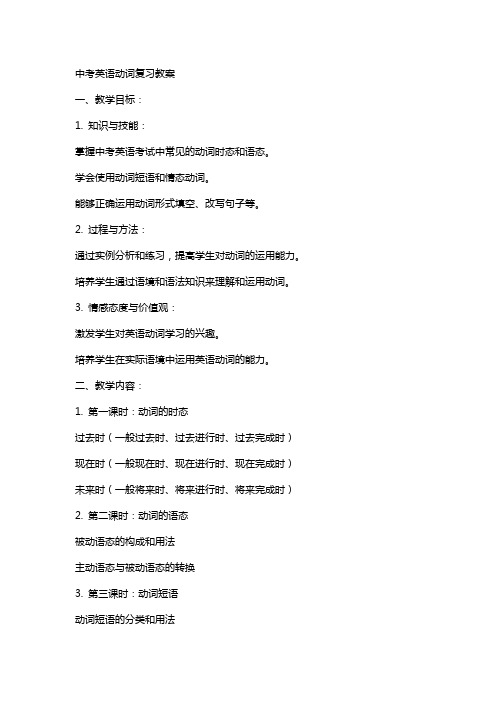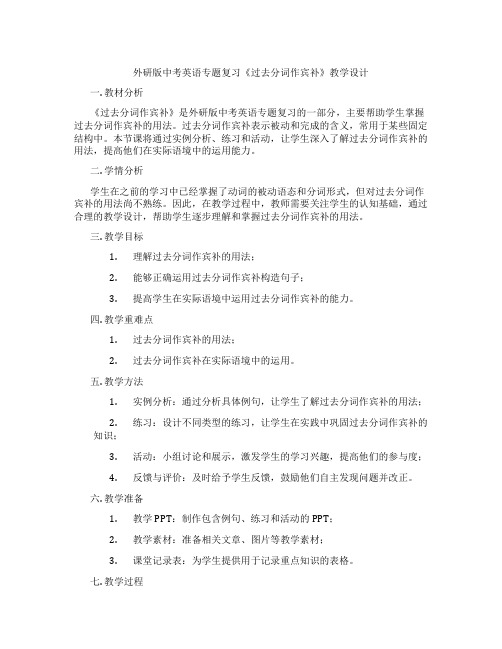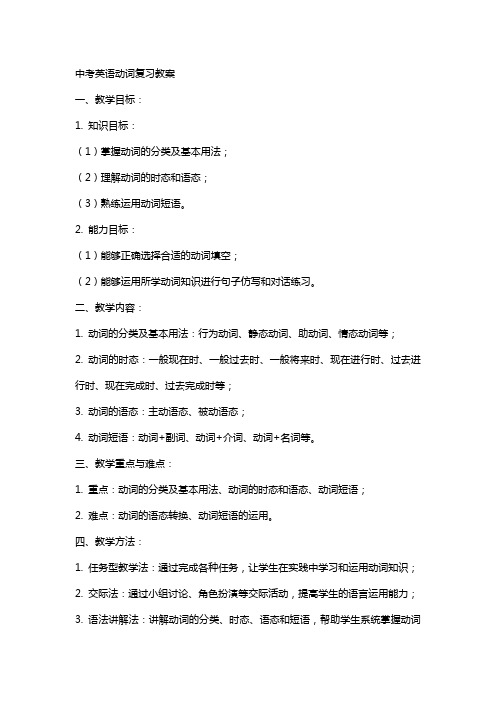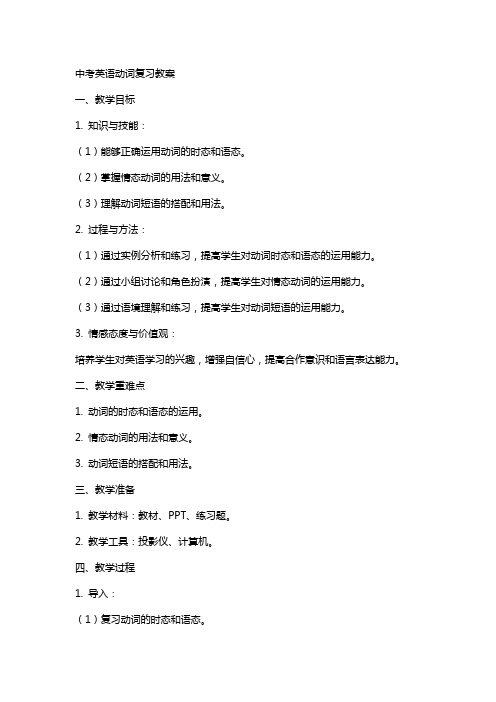外研版中考英语语法复习专题--动词教案设计
中考英语动词的复习教案

中考英语动词复习教案一、教学目标:1. 知识目标:(1)掌握动词的时态、语态、语气以及非谓语动词的用法。
(2)了解动词短语的常见搭配。
(3)熟练运用情态动词表达可能性、义务和禁止。
2. 能力目标:(1)能正确运用动词的时态、语态、语气和非谓语动词进行句子表达。
(2)能运用动词短语和情态动词完成句子和对话。
3. 情感目标:培养学生的学习兴趣,提高自信心,增强合作意识。
二、教学内容:1. 动词的时态:一般现在时、一般过去时、一般将来时、现在进行时、过去进行时、现在完成时、过去完成时、将来完成时。
2. 动词的语态:被动语态和主动语态。
3. 动词的语气:陈述语气、疑问语气、祈使语气、感叹语气。
4. 非谓语动词:动名词、分词、不定式。
5. 动词短语:常见的动词短语及其搭配。
6. 情态动词:can、may、must、should、will等的情态动词用法。
三、教学重点与难点:1. 重点:动词的时态、语态、语气和非谓语动词的用法。
2. 难点:动词短语的搭配和情态动词的辨析。
四、教学方法:1. 任务型教学法:通过完成任务,让学生在实践中掌握动词的用法。
2. 情境教学法:创设真实的语境,让学生在情境中学习动词。
3. 合作学习法:引导学生分组讨论,相互交流,提高合作能力。
五、教学过程:1. 导入:通过播放一段视频或音频,引导学生关注动词在实际语境中的运用。
2. 呈现:用PPT展示动词的时态、语态、语气和非谓语动词的图片,让学生观察并回答相关问题。
3. 讲解:讲解动词的时态、语态、语气和非谓语动词的用法,举例说明。
4. 练习:设计相关的练习题,让学生进行课堂练习,及时巩固所学知识。
5. 拓展:介绍动词短语的常见搭配,让学生进行实际操作,运用所学知识。
7. 作业布置:布置相关的作业,让学生课后巩固所学知识。
8. 反馈与评价:及时对学生的学习情况进行反馈,鼓励优秀学生,帮助后进生。
六、教学评估1. 课堂参与度:观察学生在课堂上的参与情况,包括发言、讨论、练习等。
外研版中考英语复习非谓语动词专题教学设计新部编版

精选教课教课设计设计| Excellent teaching plan教师学科教课设计[ 20–20学年度第__学期]任教课科: _____________任教年级: _____________任教老师: _____________xx市实验学校Revision of Junior English—— Non-predicate Verbs(非谓语动词)【 Step 1 】: Warming-up and leading-in(Listen to the song“PROUD OF YOU” and fill in the blanks.)【 Step 2 】:Let Ss go through what they should know about the Predicate Verbs.【Step 3 】: Talk about the usages of the Infinitive according to somepictures.(1)作主语: It ’s +adj.+( for/of )+ sb.+to do sth.Ss make sentences:(2)作宾语: want/would like/decide/hope/expect/plan/refuse 特别用法: findthink it adj. to do sth.feelSs make sentences:(3)作宾补: ask/tell/allow/sb(not)to do sth.Ss make sentences:(4)作定语: I want something to drink/eat.Ss make sentences:She is very busy.She has a lot of work.( 5)作状语:(表目的 /原由结果)Mrs Wang went to Shanghai(see)her daughter(.表目的)We're glad(meet)you here.(表原由)He is too young(go)to school.(表结果)Ss make sentences according to some pictures.(6)特别疑问词 what , which ,when, where, how (why 除外)+ to do (相当于一个宾语从句)Can you tell me how I can get to the post office?=Can you tell me to the post office?Ss activity : Do you want to have a try ?( EX )【 Step 4 】: Group work(特别用法)1、True or false:Weihai is a good place to live . ()I want a piece of paper to write.There is nothing to worry . (2、 Multiple choice:()Can you correct them?)()(1)、 Would you please not so much noise?A、to makeB、makeC、makingD、made ()(2)、 Why not at home and watch a cartoon?A、watchB、to watchC、watchingD、watched3.、Can you tell the differences?(1)、 The soldiershad the boy stand with his back to his father.(2)、 The driver had his car washed once a week.【 Step 5 】: Talk about which verbs and phrases can only follow “ doing ”?(1) Verbs:(2) Phrases:(3)need/require doing=?【 Step 6 】: GROUP TALK(易混词组辨析)①s top to do sth/stop doing sth②f orget to do sth/forget doing sth③r emember to do sth/remember doing sth④g o on to do sth/go on doing sth⑤s ee/watch/hear/notice/feel+sb+do/doing sth.Ss activity :(EX )Do you want to have a try ?() 1、 - I feel tired and sleepy.- Why not stop for a while?A、 restB、to restC、restingD、rested() 2、 Remember some time on your loved books.A、 to spendB、 spendC、spendingD、to take() 3、 - Mary dances best in our school.- I agree.I’ll never forget for the first time.A、 seeingB、 to seeC、seeD、seen() 4、 I saw them volleyball this time yesterday.A、 playB、playedC、to playD、 playing【 Step 7 】: Can you correct the mistakes as quickly as possible?1.You ’ d better not to go there(.)改为:2.The teacher told him don’ t be late for school( again). 改为:3.He kept me to wait for a week. ()改为:4.It took me one hour doing my homewrok. ()改为:5.What do you want buy? ()改为:6.I don ’ t know how to (do.)改为:7.Don ’ t forget turning off the light when you go out(.)改为:8.Have you finished to write the letter? ()改为:9.Yesterday I went to the library buying some books.()改为:10. It is not difficult for us learning English well.()改为:【 Step 8 】: Do you want to have a challenge?(挑战中考题)()1、Try to sing more English songs ,you will find it interesting a foreign language(.2011 广东)A、learningB、 learnsC、 learnD、to learn()2、—— We can use QQ to chat with each other on the Internet._____Really? Will you please show me it? (2010 广东)A、how to useB、what to useC、how can I useD、what can I use ()3、Tom’ s mother asked him some washing after dinner.( 2009 广东)A、to doB、 doesC、 doD、did()4、Doctor Wang often asked us too much meat. (2008 广东)A、don’ t eatB、not eatC、not to eatD、 doesn’t()5、From that time on Mary practised the piano every day.( 2008 广州)A、playsB、 playingC、played D 、to play【 Step 9 】: Debate (Oral practice):Should students wear school uniforms?Positive Side(正方):I think students shouldTips: ( 1) For school, convenient(方便的 ), manage(管理 )(2)For parents, (not)worry about(3)For us, have a good looking,in order保护学生之间免于相互攀比(protect from )(4)So we can spend onNegative Side(反方):I don’t think students shouldTips: (1)Chinese very ugly(2)restrict (拘束)tudents' free style(3)materials(材质 not good enough)(4)feeling: uncomfortable when we wear them.【 Step 10 】:Writing:中学生特别爱美,好多同学不大爱穿校服,请你论述你的80OutlineYour own idea I think students shouldconvenient for managementAdvantages It ’sunnecessary for parents to have a good-looking in order protect from So we can spendon Disadvantages But some of them look and the materialsWe feelImprovements So in my opinion,students should but the style and materialsStep 11Self-assesmentsHow much progress have you made in this lessonassesmentsGOOD SO— SOVERY GOODProgressListeningSpeakingReadingWriting精选教课教课设计设计| Excellent teaching plan。
中考英语动词的复习教案

中考英语动词复习教案一、教学目标:1. 知识与技能:掌握中考英语考试中常见的动词时态和语态。
学会使用动词短语和情态动词。
能够正确运用动词形式填空、改写句子等。
2. 过程与方法:通过实例分析和练习,提高学生对动词的运用能力。
培养学生通过语境和语法知识来理解和运用动词。
3. 情感态度与价值观:激发学生对英语动词学习的兴趣。
培养学生在实际语境中运用英语动词的能力。
二、教学内容:1. 第一课时:动词的时态过去时(一般过去时、过去进行时、过去完成时)现在时(一般现在时、现在进行时、现在完成时)未来时(一般将来时、将来进行时、将来完成时)2. 第二课时:动词的语态被动语态的构成和用法主动语态与被动语态的转换3. 第三课时:动词短语动词短语的分类和用法动词短语在句子中的位置和搭配4. 第四课时:情态动词情态动词的分类和用法情态动词在句子中的位置和搭配5. 第五课时:动词填空练习根据语境选择合适的动词形式填空改写句子,运用不同动词形式三、教学过程:1. 课堂讲解:通过PPT展示和讲解,让学生了解动词的时态、语态、短语和情态动词的用法。
通过实例分析,让学生理解不同动词形式在句子中的作用。
2. 课堂练习:针对每个知识点,设计相关的练习题,让学生在课堂上进行练习。
老师对学生的练习进行点评和指导,及时纠正错误。
3. 课后作业:布置相关的课后作业,巩固所学知识。
要求学生在课后进行自主学习,提高对动词的运用能力。
四、教学评价:1. 课堂表现:观察学生在课堂上的参与程度和表现,了解他们对动词知识的理解和运用能力。
2. 课后作业:对学生的课后作业进行批改,了解他们的学习效果和存在的问题。
3. 单元测试:在学习结束后,进行单元测试,评估学生对动词知识的掌握程度。
五、教学资源:1. PPT课件:制作精美的PPT课件,帮助学生直观地理解动词的知识。
2. 练习题库:设计丰富的练习题库,供课堂练习和课后作业使用。
3. 教学视频:寻找相关的教学视频,让学生更直观地了解动词的用法。
外研版中考英语语法复习专题--情态动词教案

(二)情态动词的种类:(见下表)
原形
过去式
词义
can
could
能
may
might
可以(或许)
must
must(had to)
必须(不得不)
will
would
愿意
shall
should
应该
(三)情态动词的否定形式:
cannot --- can’tcould not --- couldn’tmay not--- mayn’t
(考点1,情态动词的本身含义表格中常考的情态动词均有现在和过去,用法:1、表过去式,用于疑问句中,语气比较委婉)
(四)常用情态动词的用法:(考点2情态动词的常规考法和特殊考法)
1.can与could
1).can
(1)表示体力或脑力方面的“能力”,也能表示根据客观条件能做某事的“能力”。
He can drive.
(1)can的过去式,表示过去有能力及过去的可能性。
He couldn’t climb up the mountain.
The news could be true.
(2)表示客气地请求或委婉地陈述意见。
Could you go skating with me tomorrow?
I’m afraid I couldn’t give you an answer tonight.
2) need引导的疑问句,肯定回答时多用must,否定回答时用needn’t。
Need he come? Yes, he must.No, he needn’t.
3) need后接名词做宾语时,表示“需要”某件事物,此时用作实义动词,与一般的实义动词用法完全一样,有时态和数的变化。如:
外研版中考英语专题复习《过去分词作宾补》教学设计

外研版中考英语专题复习《过去分词作宾补》教学设计一. 教材分析《过去分词作宾补》是外研版中考英语专题复习的一部分,主要帮助学生掌握过去分词作宾补的用法。
过去分词作宾补表示被动和完成的含义,常用于某些固定结构中。
本节课将通过实例分析、练习和活动,让学生深入了解过去分词作宾补的用法,提高他们在实际语境中的运用能力。
二. 学情分析学生在之前的学习中已经掌握了动词的被动语态和分词形式,但对过去分词作宾补的用法尚不熟练。
因此,在教学过程中,教师需要关注学生的认知基础,通过合理的教学设计,帮助学生逐步理解和掌握过去分词作宾补的用法。
三. 教学目标1.理解过去分词作宾补的用法;2.能够正确运用过去分词作宾补构造句子;3.提高学生在实际语境中运用过去分词作宾补的能力。
四. 教学重难点1.过去分词作宾补的用法;2.过去分词作宾补在实际语境中的运用。
五. 教学方法1.实例分析:通过分析具体例句,让学生了解过去分词作宾补的用法;2.练习:设计不同类型的练习,让学生在实践中巩固过去分词作宾补的知识;3.活动:小组讨论和展示,激发学生的学习兴趣,提高他们的参与度;4.反馈与评价:及时给予学生反馈,鼓励他们自主发现问题并改正。
六. 教学准备1.教学PPT:制作包含例句、练习和活动的PPT;2.教学素材:准备相关文章、图片等教学素材;3.课堂记录表:为学生提供用于记录重点知识的表格。
七. 教学过程1.导入(5分钟)利用图片或故事引导学生回顾被动语态和分词形式,为新课的学习营造轻松的氛围。
2.呈现(10分钟)通过PPT展示过去分词作宾补的定义和用法,让学生初步了解这一概念。
3.操练(15分钟)设计不同类型的练习,让学生在课堂上练习运用过去分词作宾补。
例如,填空、改写句子等。
4.巩固(10分钟)学生分组讨论,互相纠正错误,教师巡回指导。
之后,选取部分学生进行展示,总结他们在运用过去分词作宾补过程中遇到的问题。
5.拓展(10分钟)学生进行小组活动,运用过去分词作宾补的知识完成任务。
英语动词复习教案外研社九年级下[1]
![英语动词复习教案外研社九年级下[1]](https://img.taocdn.com/s3/m/473da37c492fb4daa58da0116c175f0e7cd11997.png)
连系动.. 连系动词本身有一定的意义, 但不完整, 不能单独作谓语, 必须和表语一起构成谓语。常见的连系动词有be, become, get, look, seem, feel, smell, sound, keep, become, turn, fall. e.g.Sh.i..goo.swimmer.
e.g.Th.su.shon.brightl.thi.morning.
连系动.. 连系动词本身有一定的意义, 但不完整, 不能单独作谓语, 必须和表语一起构成谓语。常见的连系动词有be, become, get, look, seem, feel, smell, sound, keep, become, turn, fall. e.g.Sh.i..goo.swimmer.
用来代替前面刚提到的动词避免重复
e.g..wor.harde.tha.h.does.
助动词shall/should与will/would的用法
shall构成一般将来时, should构成过去将来时, 用于第一人称, 后接动词原形。
e.g.W.shal.visi.th.Scienc.Museu.nex.month..H.aske.m.i..shoul.tak.par.i.th.sport.meet.
Step3.Answe.th.questions
The students ask and answer in pairs and then show the answers to the class.
动词(Verbs)
动词的种类按其作用可分为行为动词(实义动词)、连系动词、助动词和情态动词
行为动词(实义动词) 行为动词意义完整, 能独立用作谓语
外研版中考英语语法复习专题--动词教案

一、用所给词的适当形式填空
1.He_____ swimming in the river every day in summer. (go)
2. Look, the children______ basketball on the playground. ( play )
3. He ______to the radio when I came in. ( listen )
2、含时态的单词填空解题技巧
教学手段、方法
讲解陈述,练习巩固
教具
PPT,computer,blackboard
教
学
过
程
一、Warming up
1、听写(纸制小测验)所复习的单词和词组。
形容词,副词知识点检测复习。
2、Presentation
1、一般现在时的用法:
1)表示经常性、习惯性的动作(do);主语所具备的特征(be);普遍存在的真理。
3)动词变化:动词后+ed或d(背不规则变化表)
E.gThey weren't able to come because they were so busy.(be--状态)
The police stopped me on my way home last night.(do--动作)
3.一般将来时的用法:
I have worked,(写出三单形式)
2、抄写各个时态的动词变化
学生掌握情况知识反馈:
领
导
审
阅
自我评价:
课题:
中考语法复习专题 动词的时态
教学目标:
1、了解六大时态的时间界限和基本概念。
2、通过概念理解,理解掌握6个主要时态的结构和动词变化。
外研版中考英语专题复习《非谓语动词作主语、宾语及补语的用法》说课稿

外研版中考英语专题复习《非谓语动词作主语、宾语及补语的用法》说课稿一. 教材分析外研版中考英语专题复习《非谓语动词作主语、宾语及补语的用法》这一章节,主要围绕非谓语动词在句子中的不同功能进行讲解。
通过本章的学习,学生能够掌握非谓语动词作主语、宾语及补语的用法,并能够熟练运用到实际语境中。
二. 学情分析在学习本章之前,学生已经掌握了非谓语动词的基本形式和用法,但对于非谓语动词在句子中的不同功能可能还存在一定的模糊认识。
因此,在教学过程中,需要针对学生的实际情况进行针对性的讲解和练习。
三. 说教学目标1.知识与技能目标:学生能够掌握非谓语动词作主语、宾语及补语的用法,并能够正确运用到实际语境中。
2.过程与方法目标:通过讲解、练习和实际语境的应用,提高学生运用非谓语动词的能力。
3.情感态度与价值观目标:激发学生学习英语的兴趣,培养学生的英语素养。
四. 说教学重难点1.教学重点:非谓语动词作主语、宾语及补语的用法。
2.教学难点:非谓语动词在不同语境中的运用和区分。
五. 说教学方法与手段1.教学方法:采用讲授法、练习法、情景教学法和小组合作学习法。
2.教学手段:利用多媒体课件、教材、练习册等教学资源。
六. 说教学过程1.导入:通过一个简单的谜语,引导学生进入非谓语动词的学习。
2.讲解:讲解非谓语动词作主语、宾语及补语的用法,并结合实例进行分析。
3.练习:设计不同类型的练习题,让学生进行巩固练习。
4.实际应用:创设实际语境,让学生运用所学知识进行口语表达。
5.总结:对本节课的主要内容进行总结,并提醒学生注意非谓语动词在不同语境中的运用和区分。
6.作业布置:布置相关的练习题,让学生进行课后巩固。
七. 说板书设计板书设计要清晰、简洁,能够突出本节课的重点内容。
可以设计成思维导图的形式,将非谓语动词作主语、宾语及补语的用法进行直观展示。
八. 说教学评价教学评价可以采用课堂表现、练习完成情况和课后作业三种方式进行。
外研初中英语语法汇总教案

外研初中英语语法汇总教案本节课是外研初中英语语法复习中的一部分内容,主要涉及动词的时态、语态、情态动词、被动语态、主谓一致、句子结构等基本语法知识。
这些语法点是初中英语学习中的重要组成部分,对于学生掌握英语语言规则、提高语言运用能力具有重要意义。
二、教学目标1. 掌握各种动词时态的构成和用法,能够正确运用现在时、过去时、将来时等时态描述动作或状态。
2. 理解语态的概念,掌握被动语态的构成和用法,能够正确运用被动语态表达动作的承受者。
3. 掌握情态动词的用法,能够根据语境选择适当的情态动词表达可能性、建议、命令等意义。
4. 掌握主谓一致的规则,能够正确判断句子中主语和谓语动词的一致性。
5. 了解句子结构的基本类型,能够正确运用陈述句、疑问句、祈使句、感叹句等句型表达意义。
6. 提高学生的语法运用能力,使他们在日常交流中能够准确、流畅地使用英语。
三、教学重难点1. 动词时态的运用,特别是在复杂句子中的使用。
2. 被动语态的构成和用法。
3. 情态动词的辨析和运用。
4. 主谓一致在不同语境中的运用。
5. 句子结构的理解和运用。
四、教学方法采用任务型教学法,通过小组讨论、角色扮演、句型练习等互动活动,激发学生的学习兴趣,提高他们的语法运用能力。
同时,运用多媒体教学手段,为学生提供丰富的学习资源,帮助他们更好地理解和掌握语法知识。
五、教学步骤1. 导入:通过情景交际,引导学生复习动词的时态、语态、情态动词等基本语法知识。
2. 新课内容展示:讲解动词的时态、语态、情态动词、被动语态、主谓一致、句子结构等语法点,并通过例句演示其用法。
3. 课堂互动:学生分组进行语法练习,教师巡回指导,及时纠正错误,帮助学生巩固所学知识。
4. 语法巩固:设计不同难度的练习题,让学生在课堂上完成,检验他们对于语法知识的掌握程度。
5. 总结与拓展:对本节课的语法知识进行总结,引导学生发现规律,提高他们的语法运用能力。
6. 作业布置:布置课后练习,要求学生回家后复习巩固所学语法知识。
中考英语动词的复习教案

中考英语动词复习教案一、教学目标:1. 知识目标:(1)掌握动词的分类及基本用法;(2)理解动词的时态和语态;(3)熟练运用动词短语。
2. 能力目标:(1)能够正确选择合适的动词填空;(2)能够运用所学动词知识进行句子仿写和对话练习。
二、教学内容:1. 动词的分类及基本用法:行为动词、静态动词、助动词、情态动词等;2. 动词的时态:一般现在时、一般过去时、一般将来时、现在进行时、过去进行时、现在完成时、过去完成时等;3. 动词的语态:主动语态、被动语态;4. 动词短语:动词+副词、动词+介词、动词+名词等。
三、教学重点与难点:1. 重点:动词的分类及基本用法、动词的时态和语态、动词短语;2. 难点:动词的语态转换、动词短语的运用。
四、教学方法:1. 任务型教学法:通过完成各种任务,让学生在实践中学习和运用动词知识;2. 交际法:通过小组讨论、角色扮演等交际活动,提高学生的语言运用能力;3. 语法讲解法:讲解动词的分类、时态、语态和短语,帮助学生系统掌握动词知识。
五、教学过程:1. 导入:通过图片或情境引入动词的概念,激发学生的学习兴趣;2. 讲解:讲解动词的分类、时态、语态和短语,结合实例进行解释;3. 练习:设计不同类型的练习题,让学生巩固所学知识;4. 交际活动:组织小组讨论、角色扮演等交际活动,让学生运用动词知识进行实际操作;5. 总结:对本节课的内容进行总结,强调重点和难点;6. 作业布置:布置相关练习题,巩固所学知识。
六、教学评价:1. 课堂参与度:观察学生在课堂上的参与情况,是否积极回答问题、参与讨论和交际活动;2. 练习完成情况:检查学生完成的练习题,评估其对动词知识的掌握程度;3. 作业完成情况:评估学生提交的作业,检查其对课堂所学知识的巩固情况;4. 口语表达:在交际活动中,评估学生的口语表达能力,是否能够正确运用动词知识进行交流。
七、教学拓展:1. 动词词组游戏:设计动词词组游戏,让学生在游戏中巩固动词短语的使用;2. 动词故事创作:让学生运用所学动词知识,创作小故事,培养学生的创造性思维;3. 动词墙:在班级墙上展示学生创作的动词相关作品,鼓励彼此学习和交流。
中考英语动词的复习教案

中考英语动词复习教案一、教学目标1. 知识与技能:(1)能够正确运用动词的时态和语态。
(2)掌握情态动词的用法和意义。
(3)理解动词短语的搭配和用法。
2. 过程与方法:(1)通过实例分析和练习,提高学生对动词时态和语态的运用能力。
(2)通过小组讨论和角色扮演,提高学生对情态动词的运用能力。
(3)通过语境理解和练习,提高学生对动词短语的运用能力。
3. 情感态度与价值观:培养学生对英语学习的兴趣,增强自信心,提高合作意识和语言表达能力。
二、教学重难点1. 动词的时态和语态的运用。
2. 情态动词的用法和意义。
3. 动词短语的搭配和用法。
三、教学准备1. 教学材料:教材、PPT、练习题。
2. 教学工具:投影仪、计算机。
四、教学过程1. 导入:(1)复习动词的时态和语态。
(2)引入情态动词和动词短语的概念。
2. 教学内容与活动:(1)讲解动词的时态和语态,通过实例分析和练习,让学生掌握一般现在时、一般过去时、一般将来时、现在进行时、过去进行时、现在完成时、过去完成时、被动语态和主动语态的用法。
(2)讲解情态动词,包括can、may、must、should、will等,通过小组讨论和角色扮演,让学生理解情态动词的意义和用法。
(3)讲解动词短语,通过语境理解和练习,让学生掌握常见的动词短语搭配,如“look forward to”、“get along with”、“make a decision”等。
3. 练习与反馈:(1)让学生完成相关的练习题,检测对动词时态和语态的掌握程度。
(2)让学生完成情态动词的练习题,检测对情态动词的掌握程度。
(3)让学生完成动词短语的练习题,检测对动词短语的掌握程度。
五、课后作业1. 复习课堂所学内容,巩固动词的时态和语态、情态动词和动词短语的用法。
2. 完成课后练习题,提高对动词的运用能力。
3. 准备下一节课的课堂展示。
六、教学评价1. 课堂参与度:观察学生在课堂上的积极参与情况,提问和回答问题的积极性。
外研版中考英语语法复习专题--主谓一致教案设计

2.There be句型中be的形式由它后面的第一个名词的数决定。
eg. There aren’t any letters in the mail for you today.
Thereis apen, two pencils and several books on the desk.
2代词none, neither, all的不可数形式还是复数形式由它们指的内容决定.
eg. All hope has gone./All are agreed on this point.
3定语从句中,如果关系代词做主语,则从句的谓语动词应与先行词保持一致
eg. Do you know the girl who speaks English?
***句型为:each A and each B,No A and no B,Every A and every B+谓动单数
对比记忆:
1.主语表示的是两个人或两件不同的事物,谓语动词用复数形式
eg. My brother and I have both seen that film.
2.主语表示具有两个身份或性质的同一eacher is coming.那位作家兼教师来了。(作家和教师指同一个人)
The writer and the teacher are coming.作家和老师来了。(作家和老师是两个人)
4.)一些由两个相同部分组成一体的复数名词,如trousers,glasses,shoes等,作主语时,若前面有“一条”、“一副”、“一把”之类的量词,则谓语动词用单数,不带量词时,则谓语动词用复数形式。
4限定词短语all of…; none of…; a lot of…;以及分数/百分数+of….; most of…修饰名词构成的名词短语做主语时,谓语动词的形式由of后面的名词形式决定。
中考常考语法题型总结教案教学设计(外研版英语中考复习)

中考常考语法题型总结教案教学设计(外研版英语中考复习)一、冠词1、定冠词the(1)表示一家人The Smith are very nice to their neighbors.The Greens are preparing for the coming Thanksgiving Day.(2)表示一类人, 谓语用复数The poor sometimes are even happier than the rich.(3)表示确定的人或事A. 双方都知道的人或事Would mind open the door?Let’s go to the libraryB. 后面有限定的,常常是定语从句。
如:Is this the book you talked about yesterday?(4)独一无二的事物the sun,the Great Wall. The earth runs around the sun.(5)序数词、最高级、西洋乐器前序数词。
试比较:A. He got the first prize in the maths competition. (用the,前面无my, his等形容词性物主代词修饰)B. I got my first birthday gift at the age of ten. (不用the,前面有形容词性物主代词修饰)最高级同理,如:A. I try my best to win the first prize.B I’m the best.西洋乐器前面John loves playing the guitar.Tom loves play football.2、不定冠词 a/an用于可数名词前,表示一个或一类人或事。
A. I ate an apple this morningB.Tom bought a toy car for his son.C. A plane is a machine that can fly. (常用来表示定义)以元音开头的字母(非元音字母a, e,i,o,u, 如an “s”,而不是a “s”)用an. 原理是两个元音连在一起发音有些不便,因此加个辅音”n“隔开。
中考英语动词的复习教案

中考英语动词复习教案一、教学目标1. 知识目标:(1)掌握动词的时态、语态、情态动词的用法。
(2)掌握动词短语的搭配。
(3)区分动词同义词,提高学生的词汇运用能力。
2. 能力目标:(1)能运用所学动词知识,进行简单的句子构建。
(2)能在实际情景中正确运用情态动词和动词短语。
3. 情感目标:激发学生学习动词的兴趣,提高学生的自信心。
二、教学重难点1. 教学重点:(1)动词的时态、语态、情态动词的用法。
(2)动词短语的搭配。
2. 教学难点:(1)动词同义词的区分。
(2)动词在实际情景中的运用。
三、教学方法1. 任务型教学法:通过完成各种任务,激发学生的学习兴趣,提高学生的实践能力。
2. 情境教学法:创设各种真实情境,让学生在实际语境中学习动词的用法。
3. 小组合作学习:培养学生团队合作精神,提高学生的学习效果。
四、教学准备1. 教学材料:教材、课件、练习题、动词卡片等。
2. 教学设备:投影仪、电脑、音响等。
五、教学过程1. 导入:(1)播放一首英文歌曲,让学生跟唱,激活学生的学习热情。
(2)引导学生回顾已学的动词知识,为新课的学习做好铺垫。
2. 呈现:(1)通过课件展示本节课要学习的动词短语。
(2)引导学生观察、讨论动词短语的用法。
3. 操练:(1)分组进行动词短语游戏,让学生在实践中掌握动词短语的用法。
(2)组织学生进行角色扮演,运用动词短语进行对话。
4. 巩固:(1)让学生完成相关练习题,巩固所学知识。
(2)引导学生进行小组讨论,分享学习心得。
5. 拓展:(1)讲解动词同义词的区分。
(2)让学生进行动词同义词填空练习。
6. 总结:对本节课所学内容进行总结,强调重点知识点。
7. 作业布置:布置相关的练习题,让学生课后巩固所学知识。
六、教学反思本节课结束后,教师应认真反思教学效果,分析学生的学习情况,针对存在的问题进行改进,以确保教学目标的实现。
七、评价与反馈1. 课堂表现评价:观察学生在课堂上的参与程度、发言情况、合作意识等,给予及时的鼓励和指导。
英语:情态动词 复习教案(外研社九年级下)

疑问句中must改为can .He must be ill. He looks so pale.She’s wearing a diamond necklace. She must have a lot of money.注:must表推测时,其反义疑问句与must后面的动词一致。
There must be something wrong ,____ ____?4.need的用法need既可用作情态动词,也可用作实义动词。
用作情态动词时,主要否定句或疑问句中。
用作实义动词时,可用于各种句式。
1).用作情态动词,用于否定句和疑问句中。
a).Need I ….? Yes , you must / No, you needn’t .Need we finish the work today ?Yes you __?A.needB.canC. mayD.mustb).need + do sth . 变否定句:needn’t do sth变疑问句:Need sb do sth ?2).用作实义动词a).need + to do sth . We need _______(buy) some school things . 变否定句:don’t /doesn’t /didn’t +need to do sth .变疑问句:Do / Does /Did sb + need to sth ?Yes , … do/ does / did No, sb don’t / doesn’t /didn’t .You don’t need to do it yourself.b).当主语是物时。
Sth + need + doing sth = Sth +need to be done . The table needs painting . =The table needs _____ _____ _____ .5.had better 的用法1). had better + 动词原形= It’s best to do sth .You had better ______ (stay )at home . = _____ ______ ______ stay at home .2). Had better not +动词原形We had better ________(not play ) the computer games .6.must 与have to1).一般情况下,两者可互换。
外研版英语中考《非谓语动词作主语、宾语及补语的用法》专题复习教学设计

外研版英语中考《非谓语动词作主语、宾语及补语的用法》专题复习教学设计一. 教材分析外研版英语中考《非谓语动词作主语、宾语及补语的用法》专题复习,主要针对非谓语动词在句子中的不同功能进行深入讲解。
本节课的内容包括动名词、分词和不定式三种非谓语动词的用法,以及它们分别作为主语、宾语和补语的示例。
教材通过丰富的例句和练习,帮助学生掌握非谓语动词的用法,提高他们的英语运用能力。
二. 学情分析学生在初中阶段已经学习了非谓语动词的基本用法,但对于动名词、分词和不定式在句子中的功能区分,以及在实际语境中的运用还存在一定的困难。
因此,在教学过程中,需要针对学生的实际情况,通过例句和练习,让学生在理解的基础上,熟练掌握非谓语动词作主语、宾语及补语的用法。
三. 教学目标1.掌握非谓语动词的基本用法,包括动名词、分词和不定式。
2.能够正确判断非谓语动词在句子中的功能,如主语、宾语和补语。
3.提高学生在实际语境中运用非谓语动词的能力。
四. 教学重难点1.非谓语动词的三种形式(动名词、分词和不定式)的区分和运用。
2.非谓语动词在句子中作主语、宾语和补语的用法。
五. 教学方法采用启发式教学法、交际法和学生主体参与法。
通过设置问题、情景和练习,引导学生主动探究非谓语动词的用法,在实际语境中进行交流和运用。
六. 教学准备1.PPT课件:包括非谓语动词的基本用法、例句和练习。
2.教学素材:包括与非谓语动词相关的文章、图片和视频。
3.练习题:针对非谓语动词作主语、宾语和补语的用法进行设计。
七. 教学过程1.导入(5分钟)通过提问方式引导学生回顾非谓语动词的基本用法,激发学生的学习兴趣。
例如:“请大家回忆一下,我们学过的非谓语动词有哪些形式?”2.呈现(10分钟)通过PPT展示非谓语动词作主语、宾语和补语的例句,让学生直观地了解它们的用法。
同时,引导学生分析例句中的非谓语动词形式和功能。
3.操练(15分钟)让学生分成小组,根据呈现的例句,自己构造句子,练习非谓语动词作主语、宾语和补语的用法。
外研版中考初中英语情态动词教案

外研版中考初中英语情态动词教案一、选择题1.Please don't make so much noise. I ________ hear the speaker very well.A.needn't B.can't C.shouldn't D.mustn't2.To my joy, we_________ go to the bank. Mary has lent us some money.A.shouldn’t B.needn’t C.couldn’t D.wouldn’t 3.—There is a knock at the door.—It ________ be my mom. She always comes back home at this time.A.may B.may not C.must D.can’t4.—Be careful! Fire ________ be dangerous sometimes.—OK. I will put it out right away.A.mustn’t B.should C.can D.needn’t5.Our Chemistry teacher always tells us we ________ be too hardworking before the exams. A.mustn’t B.shouldn’t C.needn’t D.can’t 6.Exercise is helpful but it ________ be regular (规律的) exercise.A.must B.may C.can D.need7.You ________ write the report again because spelling mistakes are not allowed at all. A.must B.can C.may D.could8.I ________ hear you clearly. Would you please repeat it?A.mustn’t B.can’t C.needn’t D.shouldn’t 9.—Why didn’t you tell it to me earlier?— Why ________ I? I want to have my own secret.A.can B.may C.should D.shall 10.—Have you decided to take up teaching as career after graduation?—I ________ go abroad for further education instead. But it depends.A.must B.should C.may D.shall11.—Is it really necessary for me to go shopping with a mask on?—I’m afraid you ________ in public. It is not only to protect yourself but also to protect others. A.must B.should C.can D.need12.We’ve discussed every detail of this plan and have got everything ready. But still something __________ go wrong. We still have to be very careful.A.must B.should C.would D.may 13.—Amy, I hear you've got many foreign coins._______ I have a look?—Of course, I'll fetch them for you.A.May B.MustC.Should D.Need14.You ______ pay too much attention to your pronunciation, as it is so important in the oral (口头的) test.A.shouldn’t B.mustn’t C.can’t D.needn’t 15.—Shall we go camping this summer holiday?—Nothing________be better.A.should B.could C.must D.may16.My bike was broken yesterday,so I____walk home.A.might B.had to C.must D.could 17.—Would you please________in that way? That’s not safe!—Sorry. I won’t do it any more.A.not driving B.not to drive C.no driving D.not drive 18.Think twice before making a decision, or you __________ get into trouble.A.may B.can't C.shouldn't D.mustn't 19.Don’t cross the road until the traffic lights turn green. A car_______hit you.A.need B.may C.should D.must20.If you buy your mum an iRobot floor cleaner, she ________ sweep the floor every day. A.can’t B.mustn’t C.needn’t D.shouldn’t 21.—The article says that a person’s animal sign decides his personality.—You ________ read it for fun, but don’t believe in that.A.can B.must C.shouldn’t D.needn’t 22.According to the rule, used batteries ________ be dropped in the red bin for harmful wastes. A.may B.would C.should D.might23.— Listen! Tom ________ be listening to the music while doing his homework.—Let’s go upstairs to remind him to turn it off.A.should B.could C.would D.must24.—Is that Mr Zhou?—It ________ be him. He has gone to Beijing.A.can B.may C.can’t D.shouldn’t 25.—Will Jim come to Yangzhou for a holiday?—He ________come and it depends on how much homework he will have.A.may B.should C.must D.need26.I think all the students love the weekends because, to them, they ________ get up early on Saturdays or Sundays.A.mustn’t B.don’t need C.needn’t D.can’t27.—Is it usually warm in Yancheng in May?—Yes. But it _______ be rather cold sometimes.A.must B.should C.would D.can28.Look at the floor, Tom! ________ you watch TV while having a meal?A.Should B.Could C.Must D.May29.—The high school entrance examination is coming!— Yes, our teacher tells us we ________ be too careful while taking exams.A.mustn’t B.shouldn’t C.needn’t D.can’t30.For the safety of the passengers, objects like guns ________ be carried on board.A.may not B.needn’t C.might not D.mustn’t31.—What is that young lady’s job?—She ________ be a nurse, I’m not sure.A.must B.may C.need D.would32.— What do you think of the show yesterday?— Some of them were really good but others ________ be better.A.will B.must C.need D.can 33.—Who’s the man over there? Is that Mr. Black?—It ________ be him. Mr. Black is much taller than that man.A.may B.must C.can’t D.mustn’t34.—________ I see your ID card? We have to check your personal information.—Sure. Here you are.A.May B.Need C.Should D.Must35.—I don’t care what people think.—Well, you _______ . Some opinions are worth weighing.A.should B.might C.could D.would36.You ________ drive after drinking alcohol(酒). It’s against the law.A.mustn’t B.needn’t C.couldn’t D.wouldn’t37.—I think they are enough. We ________ make so many chairs.—I don’t think so. Because nearly a quarter of them need ________.A.don’t need to; mending B.needed; to be mendedC.don’t need; mend D.need; to mend38.You ________ be careful with the camera. It costs!A.can B.will C.should D.may 39.—Who’s singing next door? Is it Miss Wang?—It ________ be her. She’s having the board meeting.A.can’t B.shouldn’t C.mustn’t D.needn’t 40.Mr. Black ________ be at home now. He went abroad on vacation last Friday.A.can’t B.mustn’t C.needn’t D.shouldn’t【参考答案】一、选择题1.B解析:B【详解】句意:请不要发出那么多噪音。
- 1、下载文档前请自行甄别文档内容的完整性,平台不提供额外的编辑、内容补充、找答案等附加服务。
- 2、"仅部分预览"的文档,不可在线预览部分如存在完整性等问题,可反馈申请退款(可完整预览的文档不适用该条件!)。
- 3、如文档侵犯您的权益,请联系客服反馈,我们会尽快为您处理(人工客服工作时间:9:00-18:30)。
1)过去某个时间段正在发生的事情。
2)时间状语:at that moment,7 o’clock yesterday evening
3)动词变化:was/were +动词ing
E.gThis time last year I was living in Brazil.
What were you doing at 10 o'clock last night?
1)一般将来时表示将来的动作或状态。
2)时间状语:tomorrow,next week,in the future等
3)动词变化:be about to +动词原形或will+动词原形;be going to+do
E.gI will leave for Beijing tomorrow.
4.现在进行时的用法:
过关检测
一、用所给词的适当形式填空
1.He_____ swimming in the river every day in summer. (go)
2. Look, the children______ basketball on the playground. ( play )
3. He ______to the radio when I came in. ( listen )
3)动词变化:动词后+ed或d(背不规则变化表)
E.gThey weren't able to come because they were so busy.(be--状态)
The police stopped me on my way home last night.(do--动作)
3.一般将来时的用法:
2、含时态的单词填空解题技巧
教学手段、方法
讲解陈述,练习巩固
教具
PPT,computer,blackboard
教
学
过
程
一、Warming up
1、听写(纸制小测验)所复习的单词和词组。
2、形容词,副词知识点检测复习。
2、Presentation
1、一般现在时的用法:
1)表示经常性、习惯性的动作(do);主语所具备的特征(be);普遍存在的真理。
10. We ______good friends since we met at school.(be)
三、Summary andHomework
1.各个时态的动词变化仿写
E.g I work in this factory,I worked in,,I will work,,I am working,I was walking,
4. —I need some paper . —I______ some for you . ( bring )
5. I can’t find my pen . Who ______it? ( take )
6. I ______my bike, so I have to walk to school. ( lose )
6.现在完成时的用法:
1)过去动作对现在造成的影响;从过去到现在并有可能持续到将来的动作;经验、经历。
2)时间状语:for, since, so far, ever, never, just, yet, till/until, up to now, in past years, always等,皆不确定的时间状语。
He plays tennis once a week.
My mother is a teacher(be)
2、一般过去时的用法:
1)过去时间里所发生的动作或存在的状态。
2)时间状语有:yesterday, last week, an hour ago, the other day, in 1982等
2)句中常用often, usually, every…,sometimes等时间状语。例如:He goes to school every day.他每天去上学。
3)动词变化:主语是I,you,复数用原型,单数在动词后加s或es。
E.gI get up at have worked,(写出三单形式)
2、抄写各个时态的动词变化
学生掌握情况知识反馈:
领
导
审
阅
自我评价:
7. He ______down and began to read his newspaper. ( sit )
8. He is very hungry. he_________ anything for three days. ( not eat )
9. We will go to the cinema if it ______fine. (be )
课题:
中考语法复习专题 动词的时态
教学目标:
1、了解六大时态的时间界限和基本概念。
2、通过概念理解,理解掌握6个主要时态的结构和动词变化。
教学重点:
1、六大时态的标志词
2、六大时态的句型以及每个时态的动词变化规律,不规则动词变化
教学难点:
1、现在完成时与过去式的区别,非延续性动词在现在完成时中的转化
3)动词变化:have/has +动词过去分词。
4)比较since和for
since用来说明动作起始时间,for用来说明动作延续时间长度。
5)非延续动词的转化:become-be,start-be on,die-dead等
E.gShe has never read this novel.
I have been a member of theParty for 10 years.
1)正在做的事
2)时间状语:look,listen,now
3)动词变化:be+动词ing(动词ing变化规则)
E.gYou are working hard today.
Kate wants to work in Italy, so she is learning Italian.
The population of the world is growing very fast.
